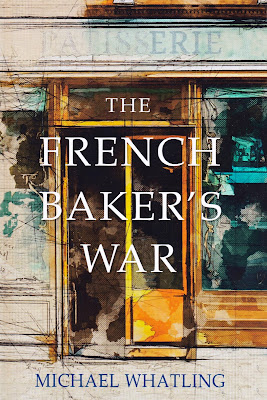When I pick up a book that is set
in France I can't stop myself from also picking up my map. It's a bad habit, I know, but I just have to
be able to see where the characters are at all times. And you never know, I might come across a place that I decide to
visit for myself when I'm next able to travel.
The other wonderful thing about books set in France is that I can live
vicariously through the characters and thereby stave off my disappointment about
not being able to be in France myself because of the current restrictions. But it's a new year and, fingers crossed, I
will be traversing the Channel in the not too distant future.
As for the book, it's set during
the occupation and focuses on a few months during 1943. Mireille and André are the married couple that own the local pâtisserie in the village of St-Léry d'Espoir in Bretagne. But it's October and the weather is getting
colder. The hardships of the occupation
are getting more stringent and there's an ingrained fear that permeates the
village which comes with being constantly watched, being unable to be sure who
can be trusted. That pervading and ever
growing sense of fear is in the words and actions of all the characters
throughout the whole of the story.
In many ways this is a dark tale set during France's années noires
and yet the over-riding theme is love.
When Mireille suddenly and without explanation disappears, André is
completely lost. Add into the mix the
arrival - unannounced and unexpected - of a woman who has clearly been held
prisoner and has escaped and you have a scenario that is dangerous for the
whole village, not just the pâtissier and his small son.
The story is told - in beautiful prose - from various points of view and
mostly in the present tense, which puts the reader right at the heart of the
action. The reader has the opportunity
to feel what André feels, to instantly understand his anguish at his wife's
disappearance and his frustration with the new situation in which he finds
himself. As the story unfolds and the
motivations of the various characters are revealed, it becomes clear that not
everyone has acted for the best of reasons.
In that respect, this story reads a little like a mystery as it moves to
a surprising conclusion.
As for St-Léry the village, there really is one in the département
of Morbihan (56). It is a small place
of less than 200 people. Does it have a
pâtisserie? No, but it does have
a road called rue de la Boulangerie where there might once have been
such an establishment. Is this the real
village of the story? I don't know, but
the author does say at the outset that his novel is 'Inspired by a true story.' Another little thing about this village is
that there is a war memorial that stands across the road from the Mairie
and, try as I might I'm not able to read the details on Google Earth.
Lastly, the history of the village is interesting. The land upon which the village stands was
given to Saint Léry (to whom the church is dedicated) by Judicaël, a King of
Bretagne, around 632, with the intention that a monastery be established. That is the earliest record of
the village and it became a formal municipality after the revolution.
Of
course, all of that history means that I will have to go there if only to visit
the 16th century church and the memorial for myself. Naturally, I will also have to sniff out the
real story behind the book!
You can read a shortened version of this review on Amazon, Goodreads and Bookbub. There will be more book reviews in the coming weeks and months...

Sounds interesting. I'll try to chase it down.
ReplyDeleteSounds interesting. I'll try to chase it down.
ReplyDeleteIt is a compelling story. I hope you enjoy it.
ReplyDelete